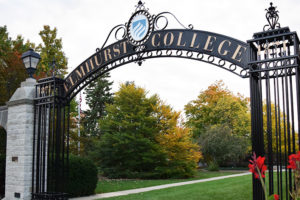
Persisting stereotypes hamper understanding between Jews and Christians, a scholar of both New Testament and Jewish studies said in the annual Abraham Joshua Heschel Guestship lecture on February 29.
“We can be different and still get along,” Amy-Jill Levine, university professor at Vanderbilt Divinity School and College of Arts and Science, told an audience of more than 300 in the Frick Center. “We can agree to disagree. Unlike mathematicians, we can have different opinions and both still be right.”
Levine suggested that the two traditions need to clear away “some of the weeds that have choked interfaith dialogue.” In the first century, she said, “Jesus was a Jew talking to other Jews,” but Jews and Christians have diverged and today travel on parallel highways heading to the same destination.
“If we define religion as a movement, distinct from ethnicity or geography, that one enters by holding certain beliefs, then Christians invented religion,” she said. “Jews never settled down simply to be a religion: They have always retained a sense of peoplehood.” Since one entered the church according to belief, Christians were hesitant to question those beliefs; to question might label one a heretic. Jews, who despite theological disagreements are nevertheless always Jews, are more apt to argue internally about the meaning of the scriptures.
Levine mentioned the common saying, “With every two Jews, you’re going to get three different views.” She is a member of an Orthodox synagogue in Nashville, Tennessee (although she describes herself as “decidedly unorthodox”). Unlike several Christian groups with a hierarchical structure of elders or deacons or bishops, “there has never been a head Jew. Even if there were, we wouldn’t listen.”
Before these two religions can truly have dialogue, long-standing stereotypes need to be swept away, Levine said. For example, many Christians perceived that Jews are burdened by observance of the Law. The truth, she said, is that Jews rejoice in the observance of Torah because the Laws help Jews sanctify their bodies, their lives, and their world. It is part of the glue that keeps them together and has preserved their identity over centuries.
Another stereotype is that Jews worship the God of wrath portrayed in the Old Testament, while Christians worship the God of love found in the New Testament. “It’s the same God,” Levine countered, and there was not a transformation after the birth of Jesus. She contrasted “the Lord is my shepherd” (Psalm 22), the Lord of “steadfast love” (Psalm 26) with Jesus’ condemnations of people to “the outer darkness” (Matthew 8, 22 and 25) to show how selective the “wrath” from “love” stereotype is. Still another is that the Jewish idea of “chosen people” suggests that Jews think that only they are in a right relationship with God. Levine explained by citing Jewish liturgy: to be “chosen” means to follow the Torah. But that does not mean that Jews think only they can be “saved.” To the contrary, Judaism speaks of “righteous gentiles.”
And, some Christians believe Jews rejected Jesus because he wasn’t the warrior they expected, but was a peacemaker instead. Not so, Levine said. First-century Jews had many different views on who the Messiah would be, and not all were expecting a warrior. Some were expecting a priest, or a prophet, or a shepherd. But most Jews expected the Messiah to bring an end to war, death, poverty and disease. The Messiah and the Messianic Age came together. Traditional Jews still wait for that Messiah to appear, much as traditional Christians are still waiting for the second coming of Christ. “When the Messiah comes,” Levine quipped, “perhaps she will surprise everyone.”
On the other side, some Jews believe that Christianity is a pagan religion that believes in drinking blood and consuming flesh. And some Jews believe Christians support Israel only because they hope it will improve the chances that Jesus will return. She provided corrections to both views.
Earlier, while meeting with students and faculty, Levine said she has been asked if Jews have horns on their heads, a stereotype fed by the depiction of horns on Michelangelo’s statue of Moses and by the comment in John’s Gospel that Jews are “children of the devil.”
“If someone brings up a stereotype, I choose to think that it’s done out of ignorance. I use that as an opportunity to correct,” she said.
Religious differences have become a focal point in the presidential election campaign, and during an interview Levine said, “I don’t think politicians should shy away from expressing their religious beliefs, but I’m disturbed when religious parochialism drives the conversation.”
“All elected officials have to represent people of other religions, and I don’t want others to impose their religious traditions on me.”